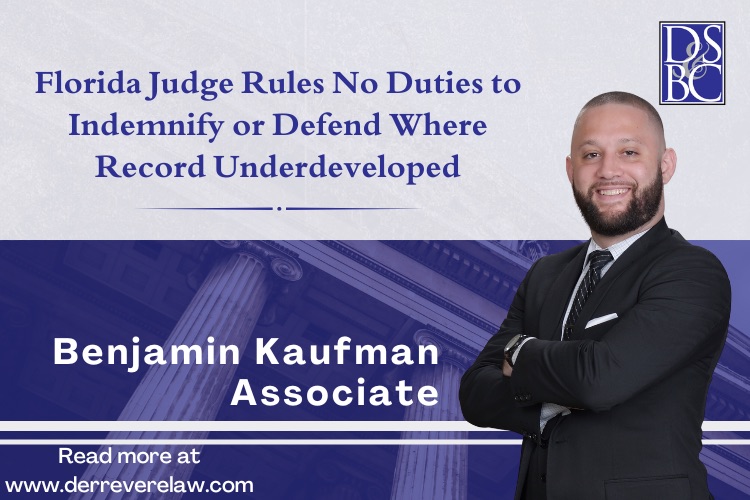Ringing in the New Year with New Florida Civil Rules of Procedure Effective January 1, 2025

For many years courts have been burdened with delays in moving cases to conclusion, primarily because attorneys were not diligent in preparing cases for trial, resulting in attorneys requesting continuances to obtain additional time to prepare for trial. One of the reasons for delays arose from the discovery process. Attorneys would delay in propounding or responding to discovery requests, or would become embroiled in discovery disputes with opposing counsel, often involving bad faith discovery requests or responses. Judges expended needless additional time to resolve these disputes, eventually causing cases to be continued, often multiple times. The pandemic magnified these problems. While the courts began to rely more heavily on case management orders containing deadlines to accelerate cases to trial, the case management orders did not resolve the delays resulting from discovery delays and disputes. In some cases, the use of case management orders created confusion when case management deadlines conflicted with deadlines in trial orders.
Therefore, on May 23, 2024, the Florida Supreme Court amended the Florida Rules of Civil Procedure, effective January 1, 2025, to address these problems. In doing so, the Supreme Court significantly changed the litigation landscape in Florida state courts. These new procedures provide a more robust calendaring system through the use of more robust case management orders, and severely restrict the ability of parties to obtain continuances necessitated by the failure of attorneys to prepare for trial in accordance with the deadlines imposed. Furthermore, the new rules are designed to streamline and accelerate the discovery process, including by adding provisions similar to the discovery procedure in Federal court and discouraging bad faith discovery requests and responses. By separate order, the Supreme Court also amended the timing requirements for summary judgments, consistent with these amendments.
Trial Management:
The Supreme Court completely rewrote Fla. R. Civ. P. 1.200 to require courts to assign most civil cases to one of three tracks within the earlier of 120 days after commencement of the case or 30 days after service of the complaint on the last-named defendant. The assignment is to be made either by a case management order or pursuant to an administrative order issued by the chief judge of the circuit. The three tracks are streamlined, general, or complex. The case tracks are based on the expected amount of judicial intervention necessary. Cases assigned to the complex track will proceed under Fla. R. Civ. P. 1.201, which was not significantly amended. The remaining cases will be assigned to either a streamlined or general track. Parties are permitted to move for a change in a track, provided the motion is filed promptly, with good cause to support the motion. The court also may change the track assignment on its own motion. The track assignment is based on the amount of judicial attention required for resolution.
A trial court must issue a case management order that specifies a projected or actual trial period based on the case track assignment. (Interestingly, the rule does not provide for a deadline for the court to issue a case management order itself. Presumably, that deadline will be established by administrative order.) The case management order must specify the projected or actual trial date based on the track assignment. Absent an administrative order providing for different time periods, streamlined cases will be expected to be ready for trial in 12 months, and general cases will be expected to be ready for trial in 18 months.
The case management order must also specify deadlines, including eight specified deadlines, which include deadlines for service of complaints, adding new parties, completion of discovery, resolution of objections to pleadings, resolution of all pretrial motions, and completion of mediation or other alternative dispute resolution. Administrative orders may require additional deadlines, such as witness and exhibit lists, to be included in the case management rather than in the trial order.
The case management deadlines are to be strictly enforced, but parties may submit an agreed order to extend a deadline if the extension does not affect the ability to comply with the remaining deadlines in the case management order. Any other change to deadlines requires a motion to amend the case management order, rather than submitting a motion for extension of an individual deadline. The new rule explicitly provides that a notice of unavailability will have no effect on the deadlines set by a case management order absent an order amending deadlines or amending the case management order.
The Supreme Court also made significant changes to Fla. R. Civ. P. 1.440, regarding setting cases for trial to provide that a case no longer has to be at issue (the pleadings have been closed) for trial to be set. The court must set the case for trial at least 45 days prior to the projected trial date in the case management order. Any order setting the trial period must set the trial to begin at least 30 days after the date of the service of the order, unless all parties agree otherwise.
The Supreme Court also rewrote Fla. R. Civ. P. 1.460, regarding continuances, to limit the grounds to obtain a continuance of trial. The revised rule explicitly provides that motions to continue a trial are disfavored and should be rarely granted – and then only upon good cause shown. The rule also explicitly provides that lack of due diligence in preparing for trial is not grounds to continue the case. The moving party must make reasonable efforts to confer with the nonmoving party about the need for a continuance. The nonmoving party must cooperate in responding and holding the conference. Even if the motion is agreed to by the parties, the motion must state the basis for the continuance and when the basis became known to the movant, the proposed date by which the parties expect to be ready for trial, and the action and specific dates for the action that will enable movant to be ready for trial. If a continuance is based on dilatory conduct of an attorney or a party, the court may impose sanctions on the attorney, party, or both.
Discovery:
The Supreme Court has significantly amended the discovery rules to bring them more in line with the Federal rules. Fla. R. Civ. P. 1.280(a) will require that the following initial discovery disclosures be made within 60 days after service of the complaint:
(A) the name and, if known, the address, telephone number, and e-mail address of each individual likely to have discoverable information, and the subjects of that information, other than information solely for impeachment;
(B) a copy or a description by category and location of all documents, electronically stored or otherwise, that the disclosing party has in its possession, custody, or control or a description by category and location of such information that the party may use to support its claims or defenses, unless the use would be solely for impeachment;
(C) a computation for each category of economic damages claimed by the disclosing party, including materials bearing on the nature and extent of injuries suffered; and the identification of categories of damages claimed, together with supporting documents; and
(D) a copy of any insurance policy for which the proceeds may be available to satisfy all or part of a possible judgment in the action or to indemnify or reimburse for payments made to satisfy the judgment.
A party is not excused from making its initial discovery disclosures because it has not fully investigated the case, because it challenges the sufficiency of another party’s initial discovery disclosures, or because another party has not made its initial discovery disclosures. Any objection to providing certain information does not excuse disclosures of remaining information.
The Supreme Court also addressed overbroad or irrelevant discovery requests by amending the scope of discovery defined in Fla. R. Civ. P. 1.280 to provide that discovery must be relevant to any party’s claim or defense and must be proportional to the needs of the case, considering the importance of the issues, the amount in controversy, the parties’ relative access to relevant information, the parties’ resources, the importance of the discovery in resolving the issues, and whether the burden or expense of the proposed discovery outweighs its likely benefit. Information within this scope of discovery need not be admissible in evidence to be discoverable.
Previously, under Florida rules, parties responding to written discovery were not obligated to update previous discovery responses as the case progressed and additional information became available. This resulted in parties having to serve multiple updated discovery requests to obtain new information. Under the new rules, parties who have made the initial disclosure or who have responded to written discovery must supplement or correct its initial disclosure or written discovery responses in a timely manner if the party learns that in some material respect the disclosure or responses are incomplete or incorrect, or as ordered by the court. There is no language requiring third parties responding to subpoenas, such as medical providers, to supplement the responses to subpoenas. Therefore, parties will presumably be required to update their nonparty requests for production, and possibly nonparty depositions, as the case progresses.
The Supreme Court also addressed bad faith or vexatious discovery requests and responses by adding a new subsection (k) to Fla. R. Civ. P. 1.280. Under this subsection, all parties, whether represented by attorney or pro se, must certify in writing, under signature, that disclosures are complete and correct at the time they were made, and that any discovery request, response or objection is consistent with the rules and is made in good faith. No party has a duty to act on an unsigned disclosure, request, response, or objection until it is signed.
May 23, 2024 Supplemental Supreme Court Order:
The deadlines for the filing of a summary judgment and responses to a summary judgment will no longer be based on a certain number of days before the trial period. The new rules regarding case management orders include deadlines for filing a summary judgment. The response to a summary judgment must be filed within 60 days after the filing of the motion for summary judgment. It is thus contemplated that the deadline for summary judgment motions will likely have to be well before 60 days prior to the commencement of the trial period.
The Supreme Court also added a new Florida rule – Fla. R. Civ. P. 1.202, Conferral Prior to Filing Motions, requiring the parties to confer before setting any non-dispositive motion for hearing, similar to Federal requirements. A certificate of conferral is required. The parties are expected to confer and attempt to resolve the issues before reserving hearing time.
Conclusion
The Supreme Court states that its purpose in amending the Rules is to create a framework for the active case management of civil cases with a focus on adhering to deadlines established early based on the complexity of the case, while providing room for customization by judicial circuit given the varying levels of volume, resources, and available automation, and to provide more effective discovery procedures. It is the Supreme Court’s intent that the amendments will promote the fair and timely resolution of civil cases.



